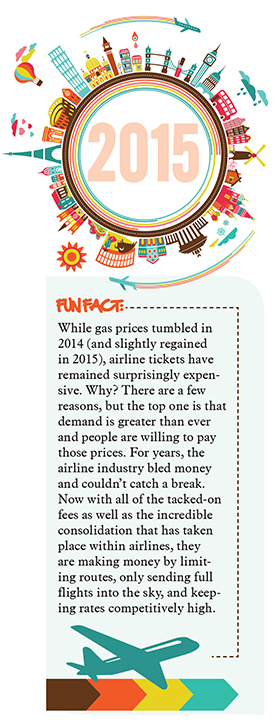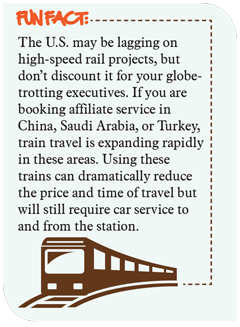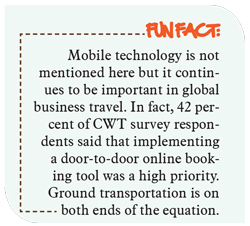BY SUSAN ROSE
The Global Business Travel Association (GBTA) expects that there will be a 6.2 percent increase in U.S. business travel in 2015, totaling $310.2 billion. That’s incredible news for those who handle their own piece of the corporate travel pie or hope to take advantage of even more in the coming months.
Travel managers, meeting planners, and procurement departments have a lot on their plates. The purpose of this article is to see where you, as the ground transportation component of their managed travel, can help them better implement programs, find discounts, keep travelers safe, and streamline reporting. In this case, you have two customers: the person or department booking the travel and the traveler himself. Let your chauffeur worry about the traveler while you work on finding solutions to these top travel management problems. Even if you don’t have a viable solution, acknowledging that problems exist and working together to resolve them will go a long way. Be a partner and continue to build those relationships.

STARTING WITH GOOD NEWS
In our industry, we can’t escape the elephants in the room that are transportation network companies (TNCs). We’d be foolish not to acknowledge their impact on our businesses, even if it’s subtle or largely indirect. While the sharing economy—which also includes Airbnb—remains strong in the leisure travel sector, a recent study by Carlson Wagonlit Travel (CWT) notes that its risks outweigh the benefits for corporate travel managers and meeting planners. From the study: “Although more travel managers are considering how to integrate these services into their programs, the uptake among business travelers will remain limited while a number of challenges remain.” Among the challenges noted:
• Safety, security, and comfort. “Host brands (e.g., Uber) conduct limited checks on their providers, often relying on user feedback. The potluck element that is an integral part of the experience may be less appropriate for busy corporate travelers and for the companies responsible for their well-being.”
• Data integration. “Only a very limited number of suppliers have an agreement with a global distribution system (e.g., FlightCar and Worldspan) enabling companies to capture the relevant travel spend data.” Uber for Business does exist, but which industry has years of logistical experience? Focus on that.
• Regulatory opposition in many cities and countries. In other words, they are watching it, too. Travel managers are tasked not only with finding the best price for their travelers, but also with keeping them safe along their journeys so they are not inclined to take any unnecessary risks at the expense of safety. With that out of the way, we are free to move on to the top concerns for 2015.
#1 Expense Management and Reporting
Is it any surprise that this is the top concern for travel managers and meeting planners across the world? Money—and better ways to spend it—is always on the minds of corporate travel managers today, so finding ways to trim here or there becomes top priority.
After a long, cold recession, business travel continues to explode on a global scale. Just like your own business, hospitality and airline providers are keeping prices at a premium to reclaim some of the money they have shed. Plane transportation has hit travel managers especially hard as fliers are being asked to pay for things that once were free—everything from a basic drink all the way up to allowing the passenger to choose his own seat regardless of class. If you have a taller traveler whom you know prefers the exit seat, he will pay a premium for being able to secure that seat, or simply be lumped in with the rest of the business-class travelers assigned seats randomly. Even carry-on bags are subject to fees. Airlines have found a way to monetize just about every little thing, and others in vertical industries are noticing. More attention will be paid to the ROI that travelers get from these meetings, and trips will likely be extended or fashioned so that more than one meeting can take place in a city or region. More time on the ground is to your benefit if you position it properly to the buyer.
There is good news: the U.S. Department of Transportation will likely issue a new ruling that airlines will have to clearly disclose ancillary fees for all passengers, much to the pleasure of travel managers who want to track these fees. This is expected to happen midyear 2015.
#2 Big Data Strikes Again
You would think with all these fees that travel managers would prefer a flat fee or simple pricing but you would be wrong. This is the age of big data, and even if they don’t know exactly what data points they need right now, offering them more rather than less will help them figure it all out. Big data is still new to travel managers as well, but more information will allow them to assess travel behavior and analyze areas for redundancy or overspending. Ask what they want, but don’t be afraid to give them more than they need as long as data are managed well and easily understood: Pages of figures with no rhyme or reason are still pages of figures. We’re all catching up, and this definitely goes hand in hand with expense management. Leveraging big data to adapt to new travel policies is the second priority of this coming year.
Once upon a time, a one-size-fits-all policy was acceptable for business travel, but organizations are using these data points to capture information and draw insights from them. The more sophisticated that data collection becomes, the more details and benchmarks corporations can make about their travelers, their spending, and levels of compliance.

Beyond just collecting data, companies are also expecting that their information is stored securely and transmitted via encrypted lines. While the data breaches of late have centered around large corporations in order to acquire credit card numbers, any type of data is valuable to someone. As the transportation provider, you are the weakest link in the chain when it comes to data threats because you likely have the least amount of security. Let 2015 be the year that you strengthen your network security and protect yourself from hackers. This should be a collaborative effort among your IT professional, software provider, and credit card processor. If your network is in any way connected to the Internet (let me rephrase: it is), then you are vulnerable. Wherever and however you access your network are points of exposure, so don’t overlook tablets, cell phones, and your home computer. Some resources can be found at fcc.gov/cyberforsmallbiz.
#3 Traveler Care
At press time, U.S. Congress was holding up funding for the Department of Homeland Security. One of the duties that falls under the department is Transportation Security Administration (TSA), which includes airport screeners and the like. As the majority of these positions are considered essential, workers would be required to be on the job—without a paycheck, if funding fails. We can only imagine how polite and friendly essential workers will be when working for free without any control over when they see a paycheck. This could lead to unionized TSA agents walking off the job or calling out, which leads to further frustration of the traveler, his travel manager, you, and everyone else involved in this chain of misery. Expect delays, prepare for the worst, and always have a backup plan. Don’t expect this to be the only political snafu this year, either. U.S. politics aside, the term “duty of care” is getting a lot of use lately (it’s mentioned extensively in our Q&A with GBTA COO Michael McCormick and Scott Solombrino on page 56). If you’re not familiar with it, you should be: Simply put, it refers to the obligation that an entity, company, or person has to ensure the safety and well-being of another in their care. This is vital for those who are traveling overseas or in sensitive areas where conflicts are taking place. Being able to track a passenger at any given moment is essential to the travel manager. According to GBTA, 80 percent of business travelers feel that their company had a legal obligation to ensure their safety while traveling abroad, and 52 percent would consider legal action if they were not supported properly. Be part of the solution. GBTA’s Risk Committee put together an excellent blog post on the topic, which you can read here: bit.ly/1GqvNhu.

#4 Spending Is Up
Business travel is continuing with a nice trend of increasing year over year. Even better? Travel spending is set to outpace price increases (airline, hotels, etc.), reflecting a cautious optimism in the global economy. According to a joint CWT/GBTA Foundation study, spending is expected to grow 8.6 percent and account for 4 percent of GDP. Air, on average is expected to rise 2.2 percent globally, while hotels will increase 2.6 percent (driven in large part by Latin America and the U.S.). It’s a refreshing change from those dark years when travel spending was being slashed.
#5 Reducing Traveler Stress
While this topic is more on the long-term wish list of travel managers rather than a goal for 2015, corporations are recognizing the impact of travel and stress on the quality of in-person meetings. In the future, it will likely become as important as duty of care and best pricing with partner hotel chains. You don’t need a study to know what impacts a traveler: flight delays, disruption of normal activity, time away from loved ones, digestive disruptions from eating on the run, language frustrations, and lost luggage (you can read CWT’s full list here: bit.ly/1LBbpew). Imagine the opportunities here! You are the experts of your community so help your visiting executives feel at home; demand the same of your affiliates. Work with the travel manager to build a profile of each traveler (this may take time; be patient). Don’t just know the best restaurants in town, but know the specialty restaurants that can allow the executive to unwind in a casual environment of comfort food. Hotels often have small workout facilities but they are more often limited than not. If you know that your executive regularly practices taekwondo in order to feel his best, vet a facility and offer it to him (or alert your affiliate). Be a mobile concierge. Be the best tour guide of your city. It will be those small things that pay off and make a difference over time, because the better the executive feels, the better the meetings will go. Eventually, this will move from wish-list status to high-priority importance, so why not be ahead of the game when it happens?
We’re starting out 2015 with good news, increased spending, and solid predictions of an overall positive year for business travel near and far. Stay ahead of the curve and you will be an invaluable partner with your corporate travel manager or meeting planning professional. [CD0315]

